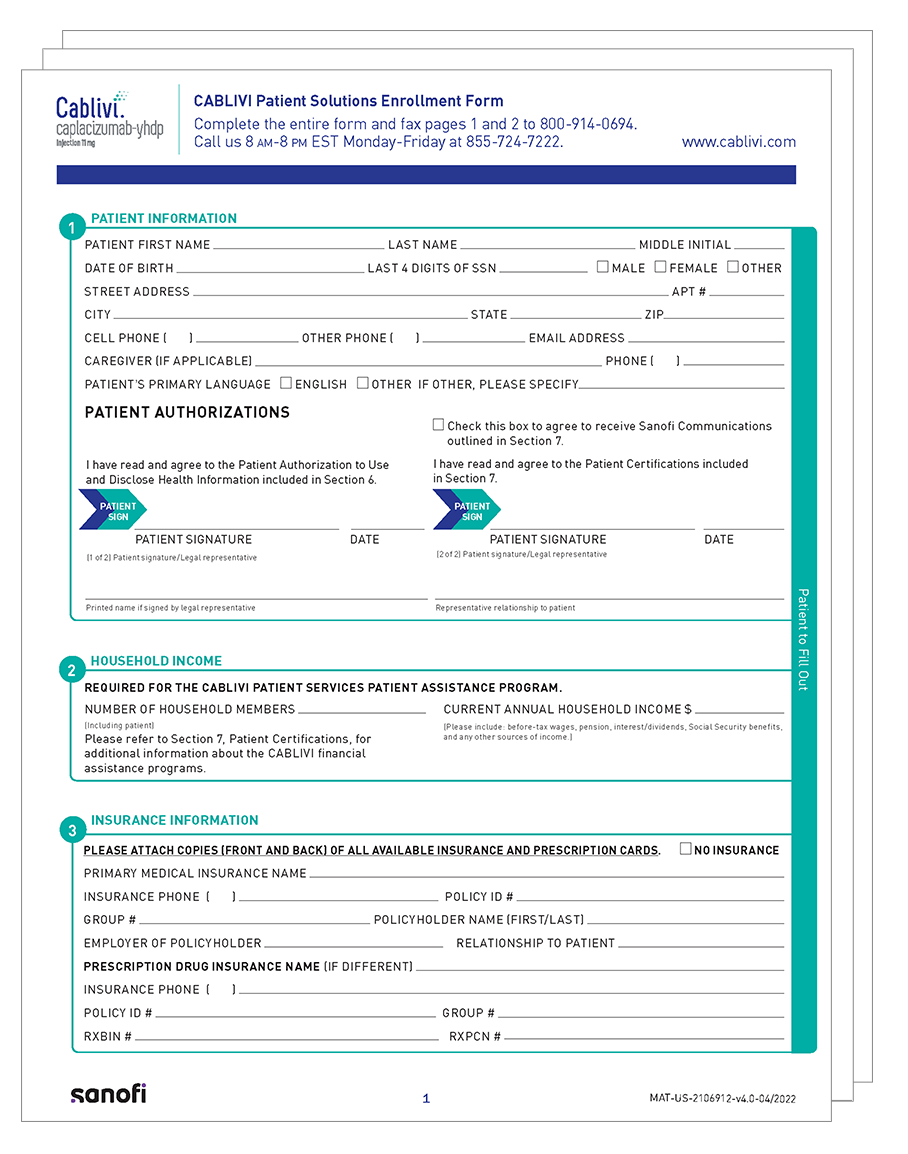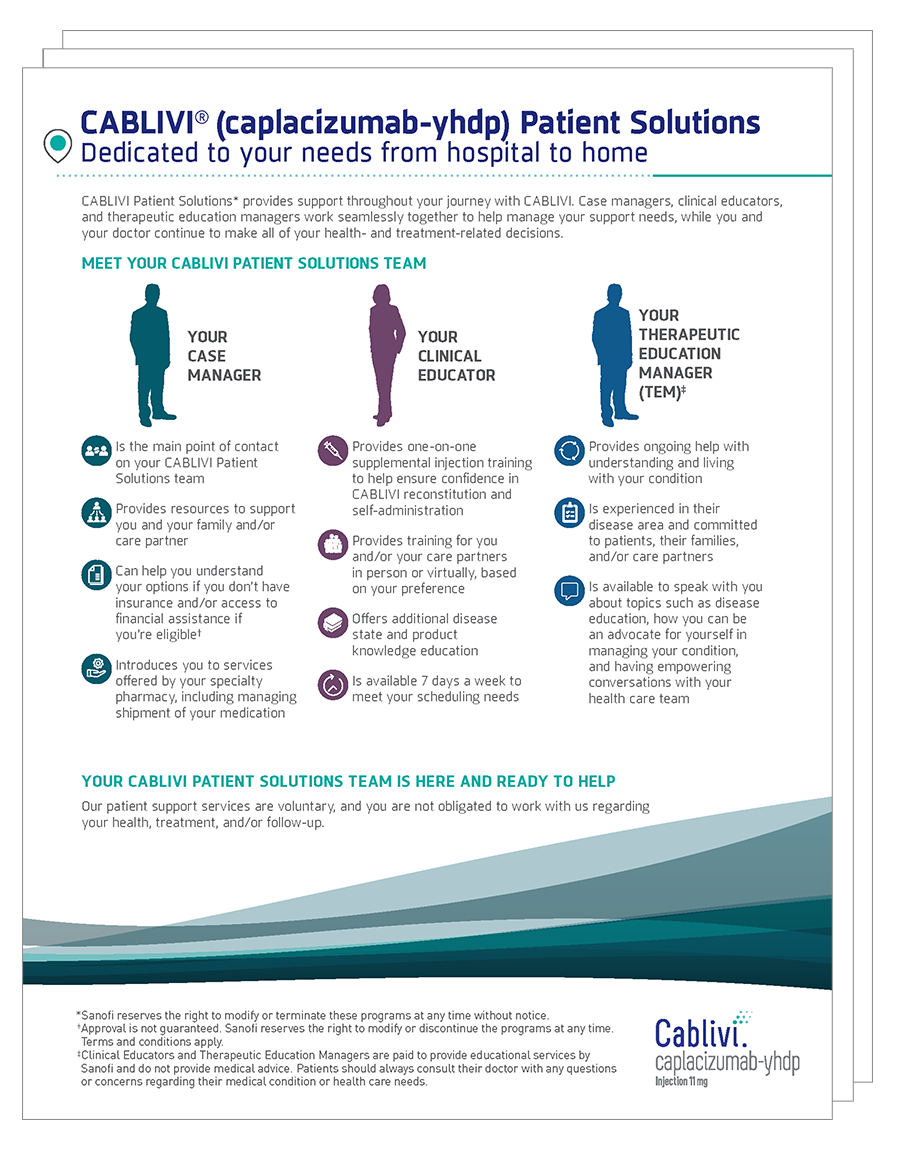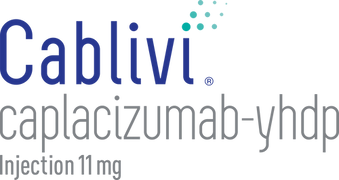Connect patients with acquired/immune-mediated thrombotic thrombocytopenic purpura (aTTP/iTTP) to a team dedicated to supporting them through every step of treatment with CABLIVI—from hospital to home
Financial and educational assistance with CABLIVI Patient Solutions
FINANCIAL ASSISTANCE FOR ELIGIBLE PATIENTS
Case Managers, the primary contact for enrolled patients with aTTP/iTTP, can help patients understand the financial support that may be available to them based on their insurance status:
- Support is available to cover the cost of CABLIVI co-pay or co-insurance up to $25,000 for qualified, commercially insured patients*
- CABLIVI will be provided at no cost to eligible underinsured or uninsured patients†
SPECIALTY PHARMACY SERVICES
Case Managers can assist patients with managing shipment of their CABLIVI therapy to their home if CABLIVI is prescribed through a specialty pharmacy. For patients who obtain their medication through Biologics by McKesson:
- The specialty pharmacy coordinates direct-to-home shipment of CABLIVI for a seamless transition upon discharge
- Nurses are available to provide ongoing support and answer questions about CABLIVI
- Pharmacists are available 24 hours a day, 7 days a week
SUPPLEMENTAL INJECTION TRAINING
Clinical Educators‡ provide additional one-on-one training for:
- Administering CABLIVI
- Questions about CABLIVI and aTTP/iTTP
- Helping patients stay on their treatment schedule
Training is provided in person or virtually, based on patient preference.

ONGOING EDUCATION
Therapeutic Education Managers‡ (TEMs) are experienced in rare blood disorders and committed to educating people living with aTTP/iTTP, their families, and care partners about topics such as:
- Disease education
- How patients can help manage their condition
- Having thoughtful conversations with their healthcare team
CABLIVI Patient Solutions is available Monday through Friday, 8:00 AM to 8:00 PM ET, at 1-855-724-7222
Sanofi reserves the right to modify or terminate these programs at any time without notice.
*Not valid for CABLIVI prescriptions covered by or submitted for reimbursement under Medicare, Medicaid, VA, DoD, Tricare, or similar federal or state programs including any state pharmaceutical assistance programs. Not valid where prohibited by law. Savings may vary depending on patient’s out-of-pocket costs. Upon registration, patient will receive all program details.
†Approval is not guaranteed. Sanofi reserves the right to modify or discontinue the programs at any time. Terms and conditions apply.
‡Clinical Educators and Therapeutic Education Managers are paid to provide educational services by Sanofi and do not provide medical advice. Patients should always consult their doctor with any questions or concerns regarding their medical condition or healthcare need.

CABLIVI Patient Enrollment Form
Enroll patients in CABLIVI Patient Solutions for access to specialty pharmacy services, financial assistance, and supplemental injection training.

CABLIVI Patient Solutions
Learn more about the support offered through CABLIVI Patient Solutions.

Access and download resources to share with your patient
Ease the transition from hospital to home
IMPORTANT SAFETY INFORMATION AND INDICATIONS
IMPORTANT SAFETY INFORMATION AND INDICATIONS
IMPORTANT SAFETY INFORMATION AND INDICATIONS
CONTRAINDICATIONS:
CABLIVI is contraindicated in patients with a previous severe hypersensitivity reaction to caplacizumab-yhdp or to any of its excipients. Hypersensitivity reactions have included urticaria.
WARNINGS AND PRECAUTIONS:
Hemorrhage:
- CABLIVI increases the risk of bleeding. In clinical studies, severe bleeding adverse reactions of epistaxis, gingival bleeding, upper gastrointestinal hemorrhage, and metrorrhagia were each reported in 1% of subjects. Overall, bleeding events occurred in approximately 58% of patients on CABLIVI versus 43% of patients on placebo.
- In the postmarketing setting cases of life-threatening and fatal bleeding were reported in patients receiving CABLIVI.
- The risk of bleeding is increased in patients with underlying coagulopathies (e.g. hemophilia, other coagulation factor deficiencies). It is also increased with concomitant use of CABLIVI with drugs affecting hemostasis and coagulation.
- Avoid concomitant use of CABLIVI with antiplatelet agents or anticoagulants. If clinically significant bleeding occurs, interrupt use of CABLIVI. Von Willebrand factor concentrate may be administered to rapidly correct hemostasis. If CABLIVI is restarted, monitor closely for signs of bleeding.
- Withhold CABLIVI for 7 days prior to elective surgery, dental procedures or other invasive interventions. If emergency surgery is needed, the use of von Willebrand factor concentrate may be considered to correct hemostasis. After the risk of surgical bleeding has resolved, and CABLIVI is resumed, monitor closely for signs of bleeding.
ADVERSE REACTIONS:
The most common adverse reactions (>15% of patients) were epistaxis (29%), headache (21%) and gingival bleeding (16%).
CONCOMITANT USE OF ANTICOAGULANTS OR ANTIPLATELET AGENTS:
Concomitant use of CABLIVI with any anticoagulant or antiplatelet agent may increase the risk of bleeding. Avoid concomitant use when possible. Assess and monitor closely for bleeding with concomitant use.
PREGNANCY:
There are no available data on CABLIVI use in pregnant women to inform a drug associated risk of major birth defects and miscarriage.
-
Fetal/neonatal adverse reactions: CABLIVI may increase the risk of bleeding in the fetus and neonate. Monitor neonates for bleeding.
-
Maternal adverse reactions: All patients receiving CABLIVI, including pregnant women, are at risk for bleeding. Pregnant women receiving CABLIVI should be carefully monitored for evidence of excessive bleeding.
INDICATIONS:
CABLIVI (caplacizumab-yhdp) is indicated for the treatment of adult patients with acquired thrombotic thrombocytopenic purpura (aTTP), in combination with plasma exchange and immunosuppressive therapy.
Please see full Prescribing Information.
Instructions For Use
Sharps Medical Waste Disposal (PDF)
Learn more about Sanofi’s commitment to fighting counterfeit drugs.
IMPORTANT SAFETY INFORMATION AND INDICATIONS
CONTRAINDICATIONS:
CABLIVI is contraindicated in patients with a previous severe hypersensitivity reaction to caplacizumab-yhdp or to any of its excipients. Hypersensitivity reactions have included urticaria.
WARNINGS AND PRECAUTIONS:
Hemorrhage:
- CABLIVI increases the risk of bleeding. In clinical studies, severe bleeding adverse reactions of epistaxis, gingival bleeding, upper gastrointestinal hemorrhage, and metrorrhagia were each reported in 1% of subjects. Overall, bleeding events occurred in approximately 58% of patients on CABLIVI versus 43% of patients on placebo.
- In the postmarketing setting cases of life-threatening and fatal bleeding were reported in patients receiving CABLIVI.
- The risk of bleeding is increased in patients with underlying coagulopathies (e.g. hemophilia, other coagulation factor deficiencies). It is also increased with concomitant use of CABLIVI with drugs affecting hemostasis and coagulation.
- Avoid concomitant use of CABLIVI with antiplatelet agents or anticoagulants. If clinically significant bleeding occurs, interrupt use of CABLIVI. Von Willebrand factor concentrate may be administered to rapidly correct hemostasis. If CABLIVI is restarted, monitor closely for signs of bleeding.
- Withhold CABLIVI for 7 days prior to elective surgery, dental procedures or other invasive interventions. If emergency surgery is needed, the use of von Willebrand factor concentrate may be considered to correct hemostasis. After the risk of surgical bleeding has resolved, and CABLIVI is resumed, monitor closely for signs of bleeding.
ADVERSE REACTIONS:
The most common adverse reactions (>15% of patients) were epistaxis (29%), headache (21%) and gingival bleeding (16%).
CONCOMITANT USE OF ANTICOAGULANTS OR ANTIPLATELET AGENTS:
Concomitant use of CABLIVI with any anticoagulant or antiplatelet agent may increase the risk of bleeding. Avoid concomitant use when possible. Assess and monitor closely for bleeding with concomitant use.
PREGNANCY:
There are no available data on CABLIVI use in pregnant women to inform a drug associated risk of major birth defects and miscarriage.
-
Fetal/neonatal adverse reactions: CABLIVI may increase the risk of bleeding in the fetus and neonate. Monitor neonates for bleeding.
-
Maternal adverse reactions: All patients receiving CABLIVI, including pregnant women, are at risk for bleeding. Pregnant women receiving CABLIVI should be carefully monitored for evidence of excessive bleeding.
INDICATIONS:
CABLIVI (caplacizumab-yhdp) is indicated for the treatment of adult patients with acquired thrombotic thrombocytopenic purpura (aTTP), in combination with plasma exchange and immunosuppressive therapy.
Please see full Prescribing Information.
Instructions For Use
Sharps Medical Waste Disposal (PDF)
Learn more about Sanofi’s commitment to fighting counterfeit drugs.
IMPORTANT SAFETY INFORMATION AND INDICATIONS
IMPORTANT SAFETY INFORMATION AND INDICATIONS
CONTRAINDICATIONS:
CABLIVI is contraindicated in patients with a previous severe hypersensitivity reaction to caplacizumab-yhdp or to any of its excipients. Hypersensitivity reactions have included urticaria.
WARNINGS AND PRECAUTIONS:
Hemorrhage:
- CABLIVI increases the risk of bleeding. In clinical studies, severe bleeding adverse reactions of epistaxis, gingival bleeding, upper gastrointestinal hemorrhage, and metrorrhagia were each reported in 1% of subjects. Overall, bleeding events occurred in approximately 58% of patients on CABLIVI versus 43% of patients on placebo.
- In the postmarketing setting cases of life-threatening and fatal bleeding were reported in patients receiving CABLIVI.
- The risk of bleeding is increased in patients with underlying coagulopathies (e.g. hemophilia, other coagulation factor deficiencies). It is also increased with concomitant use of CABLIVI with drugs affecting hemostasis and coagulation.
- Avoid concomitant use of CABLIVI with antiplatelet agents or anticoagulants. If clinically significant bleeding occurs, interrupt use of CABLIVI. Von Willebrand factor concentrate may be administered to rapidly correct hemostasis. If CABLIVI is restarted, monitor closely for signs of bleeding.
- Withhold CABLIVI for 7 days prior to elective surgery, dental procedures or other invasive interventions. If emergency surgery is needed, the use of von Willebrand factor concentrate may be considered to correct hemostasis. After the risk of surgical bleeding has resolved, and CABLIVI is resumed, monitor closely for signs of bleeding.
ADVERSE REACTIONS:
The most common adverse reactions (>15% of patients) were epistaxis (29%), headache (21%) and gingival bleeding (16%).
CONCOMITANT USE OF ANTICOAGULANTS OR ANTIPLATELET AGENTS:
Concomitant use of CABLIVI with any anticoagulant or antiplatelet agent may increase the risk of bleeding. Avoid concomitant use when possible. Assess and monitor closely for bleeding with concomitant use.
PREGNANCY:
There are no available data on CABLIVI use in pregnant women to inform a drug associated risk of major birth defects and miscarriage.
-
Fetal/neonatal adverse reactions: CABLIVI may increase the risk of bleeding in the fetus and neonate. Monitor neonates for bleeding.
-
Maternal adverse reactions: All patients receiving CABLIVI, including pregnant women, are at risk for bleeding. Pregnant women receiving CABLIVI should be carefully monitored for evidence of excessive bleeding.
INDICATIONS:
CABLIVI (caplacizumab-yhdp) is indicated for the treatment of adult patients with acquired thrombotic thrombocytopenic purpura (aTTP), in combination with plasma exchange and immunosuppressive therapy.
Please see full Prescribing Information.
Instructions For Use
Sharps Medical Waste Disposal (PDF)
Learn more about Sanofi’s commitment to fighting counterfeit drugs.
IMPORTANT SAFETY INFORMATION AND INDICATIONS
CONTRAINDICATIONS:
CABLIVI is contraindicated in patients with a previous severe hypersensitivity reaction to caplacizumab-yhdp or to any of its excipients. Hypersensitivity reactions have included urticaria.
WARNINGS AND PRECAUTIONS:
Hemorrhage:
- CABLIVI increases the risk of bleeding. In clinical studies, severe bleeding adverse reactions of epistaxis, gingival bleeding, upper gastrointestinal hemorrhage, and metrorrhagia were each reported in 1% of subjects. Overall, bleeding events occurred in approximately 58% of patients on CABLIVI versus 43% of patients on placebo.
- In the postmarketing setting cases of life-threatening and fatal bleeding were reported in patients receiving CABLIVI.
- The risk of bleeding is increased in patients with underlying coagulopathies (e.g. hemophilia, other coagulation factor deficiencies). It is also increased with concomitant use of CABLIVI with drugs affecting hemostasis and coagulation.
- Avoid concomitant use of CABLIVI with antiplatelet agents or anticoagulants. If clinically significant bleeding occurs, interrupt use of CABLIVI. Von Willebrand factor concentrate may be administered to rapidly correct hemostasis. If CABLIVI is restarted, monitor closely for signs of bleeding.
- Withhold CABLIVI for 7 days prior to elective surgery, dental procedures or other invasive interventions. If emergency surgery is needed, the use of von Willebrand factor concentrate may be considered to correct hemostasis. After the risk of surgical bleeding has resolved, and CABLIVI is resumed, monitor closely for signs of bleeding.
ADVERSE REACTIONS:
The most common adverse reactions (>15% of patients) were epistaxis (29%), headache (21%) and gingival bleeding (16%).
CONCOMITANT USE OF ANTICOAGULANTS OR ANTIPLATELET AGENTS:
Concomitant use of CABLIVI with any anticoagulant or antiplatelet agent may increase the risk of bleeding. Avoid concomitant use when possible. Assess and monitor closely for bleeding with concomitant use.
PREGNANCY:
There are no available data on CABLIVI use in pregnant women to inform a drug associated risk of major birth defects and miscarriage.
-
Fetal/neonatal adverse reactions: CABLIVI may increase the risk of bleeding in the fetus and neonate. Monitor neonates for bleeding.
-
Maternal adverse reactions: All patients receiving CABLIVI, including pregnant women, are at risk for bleeding. Pregnant women receiving CABLIVI should be carefully monitored for evidence of excessive bleeding.
INDICATIONS:
CABLIVI (caplacizumab-yhdp) is indicated for the treatment of adult patients with acquired thrombotic thrombocytopenic purpura (aTTP), in combination with plasma exchange and immunosuppressive therapy.
Please see full Prescribing Information.
Instructions For Use
Sharps Medical Waste Disposal (PDF)
Learn more about Sanofi’s commitment to fighting counterfeit drugs.
IMPORTANT SAFETY INFORMATION AND INDICATIONS
IMPORTANT SAFETY INFORMATION AND INDICATIONS
CONTRAINDICATIONS:
CABLIVI is contraindicated in patients with a previous severe hypersensitivity reaction to caplacizumab-yhdp or to any of its excipients. Hypersensitivity reactions have included urticaria.
WARNINGS AND PRECAUTIONS:
Hemorrhage:
- CABLIVI increases the risk of bleeding. In clinical studies, severe bleeding adverse reactions of epistaxis, gingival bleeding, upper gastrointestinal hemorrhage, and metrorrhagia were each reported in 1% of subjects. Overall, bleeding events occurred in approximately 58% of patients on CABLIVI versus 43% of patients on placebo.
- In the postmarketing setting cases of life-threatening and fatal bleeding were reported in patients receiving CABLIVI.
- The risk of bleeding is increased in patients with underlying coagulopathies (e.g. hemophilia, other coagulation factor deficiencies). It is also increased with concomitant use of CABLIVI with drugs affecting hemostasis and coagulation.
- Avoid concomitant use of CABLIVI with antiplatelet agents or anticoagulants. If clinically significant bleeding occurs, interrupt use of CABLIVI. Von Willebrand factor concentrate may be administered to rapidly correct hemostasis. If CABLIVI is restarted, monitor closely for signs of bleeding.
- Withhold CABLIVI for 7 days prior to elective surgery, dental procedures or other invasive interventions. If emergency surgery is needed, the use of von Willebrand factor concentrate may be considered to correct hemostasis. After the risk of surgical bleeding has resolved, and CABLIVI is resumed, monitor closely for signs of bleeding.
ADVERSE REACTIONS:
The most common adverse reactions (>15% of patients) were epistaxis (29%), headache (21%) and gingival bleeding (16%).
CONCOMITANT USE OF ANTICOAGULANTS OR ANTIPLATELET AGENTS:
Concomitant use of CABLIVI with any anticoagulant or antiplatelet agent may increase the risk of bleeding. Avoid concomitant use when possible. Assess and monitor closely for bleeding with concomitant use.
PREGNANCY:
There are no available data on CABLIVI use in pregnant women to inform a drug associated risk of major birth defects and miscarriage.
-
Fetal/neonatal adverse reactions: CABLIVI may increase the risk of bleeding in the fetus and neonate. Monitor neonates for bleeding.
-
Maternal adverse reactions: All patients receiving CABLIVI, including pregnant women, are at risk for bleeding. Pregnant women receiving CABLIVI should be carefully monitored for evidence of excessive bleeding.
INDICATIONS:
CABLIVI (caplacizumab-yhdp) is indicated for the treatment of adult patients with acquired thrombotic thrombocytopenic purpura (aTTP), in combination with plasma exchange and immunosuppressive therapy.
Please see full Prescribing Information.
Instructions For Use
Sharps Medical Waste Disposal (PDF)
Learn more about Sanofi’s commitment to fighting counterfeit drugs.
IMPORTANT SAFETY INFORMATION AND INDICATIONS
CONTRAINDICATIONS:
CABLIVI is contraindicated in patients with a previous severe hypersensitivity reaction to caplacizumab-yhdp or to any of its excipients. Hypersensitivity reactions have included urticaria.
WARNINGS AND PRECAUTIONS:
Hemorrhage:
- CABLIVI increases the risk of bleeding. In clinical studies, severe bleeding adverse reactions of epistaxis, gingival bleeding, upper gastrointestinal hemorrhage, and metrorrhagia were each reported in 1% of subjects. Overall, bleeding events occurred in approximately 58% of patients on CABLIVI versus 43% of patients on placebo.
- In the postmarketing setting cases of life-threatening and fatal bleeding were reported in patients receiving CABLIVI.
- The risk of bleeding is increased in patients with underlying coagulopathies (e.g. hemophilia, other coagulation factor deficiencies). It is also increased with concomitant use of CABLIVI with drugs affecting hemostasis and coagulation.
- Avoid concomitant use of CABLIVI with antiplatelet agents or anticoagulants. If clinically significant bleeding occurs, interrupt use of CABLIVI. Von Willebrand factor concentrate may be administered to rapidly correct hemostasis. If CABLIVI is restarted, monitor closely for signs of bleeding.
- Withhold CABLIVI for 7 days prior to elective surgery, dental procedures or other invasive interventions. If emergency surgery is needed, the use of von Willebrand factor concentrate may be considered to correct hemostasis. After the risk of surgical bleeding has resolved, and CABLIVI is resumed, monitor closely for signs of bleeding.
ADVERSE REACTIONS:
The most common adverse reactions (>15% of patients) were epistaxis (29%), headache (21%) and gingival bleeding (16%).
CONCOMITANT USE OF ANTICOAGULANTS OR ANTIPLATELET AGENTS:
Concomitant use of CABLIVI with any anticoagulant or antiplatelet agent may increase the risk of bleeding. Avoid concomitant use when possible. Assess and monitor closely for bleeding with concomitant use.
PREGNANCY:
There are no available data on CABLIVI use in pregnant women to inform a drug associated risk of major birth defects and miscarriage.
-
Fetal/neonatal adverse reactions: CABLIVI may increase the risk of bleeding in the fetus and neonate. Monitor neonates for bleeding.
-
Maternal adverse reactions: All patients receiving CABLIVI, including pregnant women, are at risk for bleeding. Pregnant women receiving CABLIVI should be carefully monitored for evidence of excessive bleeding.
INDICATIONS:
CABLIVI (caplacizumab-yhdp) is indicated for the treatment of adult patients with acquired thrombotic thrombocytopenic purpura (aTTP), in combination with plasma exchange and immunosuppressive therapy.
Please see full Prescribing Information.
Instructions For Use
Sharps Medical Waste Disposal (PDF)
Learn more about Sanofi’s commitment to fighting counterfeit drugs.
